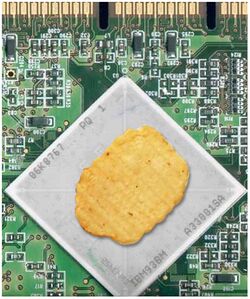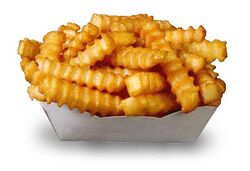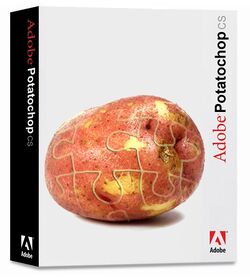Adobe Potatochop
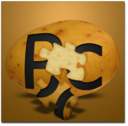 Adobe Potatochop CS4 Logo. How boring. | |
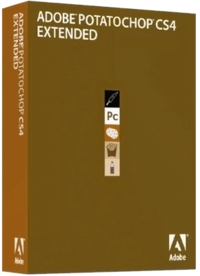 Adobe Potatochop CS4 box. Notice the crappy cover design and pretty finish. | |
| Maintainer(s) | Adobe Systems |
|---|---|
| Stable release | None |
| Preview release | Adobe Yusho |
| Operating system | America's and Britain's Fast Food Chains |
| Software license | Proprietary software |
| Percentage of users | 2% |
Adobe Potatochop CS4 is the industry standard software for chip production amongst chip shops the length and breadth of England. Available with a number of plugins, including the most recent 'extra crispy' update, it is, along with Adobe Suppersready and Adobe Fritolayers, one of Adobe's most well known pieces of software.
Released first in the United States, it is currently available for Pringles XP and Pringles Vista under the slogan "Once you chop, you can't stop" and also for Apple Mac as CS4 (Chip Shop 4). The latest version of this popular software is bundled as part of the CS Studio range, along with Adobe Fritolayers, and the recently acquired Macromedia Frites, Macromedia Fryworks and Macromedia DreamGriddler.
Current Crop
Adobe Potatochop CS5 (CS stands for Chip Shop, and replaces the previous numbering system, which was utilised up to Version 7.01) represents the cutting edge of Potato Manipulation Software. The latest version allows to mix potato breeds, improves rendering backgrounds so that you can add more potatos, and model 3-D potatos.
Maintaining much of the traditional interface, many feel that with a minimum of training, anyone, from first time users to seasoned professionals, can benefit from using this effective and comprehensive program.
Online Communities
Such has been the success of Adobe Potatochop amongst the potato manipulation fratfritterternity entire online communities have arisen, offering everything from advice for basic "chipping" through to advanced potato sculpting. The most popular are SpudWorld, PlanetPotatochop and Worth1000KingEdwards.com.
In recent years the term "potatochopping", and to a lesser extent "potatochipping", have become neologisms, having come to mean "potato manipulation" (often regardless of the actual software or hardware utilised). The shorter term "chopped" (or occasionally "chipped") is also frequently used.
This term should not, under any circumstances, be confused with the term 'Photoshopping', a derogatory term for poor image manipulation. Example of use: Some may claim that the popular television show What Not To Wear utilises excessive Photoshopping.
International Differences
Whilst the generic name 'Potatochop' is recognised the world over, there exist certain differentiations from country to country in attempts to aid recognition in a particular culture. Thus, each nation in which Potatochop is released has its own particular version name. The following table provides a breakdown of each of these. Whilst the generic name 'Potatochop' is recognised the world over, there once exist certain differentiations from country to country in attempts to aid recognition in a particular culture. Thus, each nation in which Potatochop is released has its own particular version name.
| Name of Country | Regional Variation in name | Additional Plugin |
|---|---|---|
| Britain | Adobe Potatocrisp | Fish and Chips |
| United States | Adobe Potato Fries | Freedom Fries* and Hamburger |
| Canada | Adobe PommeFrite | Poutine and Le Back Bacon |
| Australia | Adobe Pertaidercheep | Feesh and Cheeps |
| New Zealand | Adobe Pertaiderchup | Fush and Chups |
*This was changed back to "French Fries" in 2006.
Filters
Adobe Potatochop has a wide range filters, the most popular are:
- Skinned
- Blanched
- Crunchy Fries
- Greasy Fries (used by fast food chains nationwide)
- Curly Fries
- Crinkle-Cut Fries
- McDonald's fries
- TV Snacks Instant for Microwave , With Cancer
File Formats
- DFD: Deep Fried Document. The original version.
- COD: Cheese and Onion Document. Also available with battered cod.
- FFD: Freedom Fries Document. The most common format in the United States version, compatible with the French Fries plugin.
- CHIP: British version of the FFD format. Includes pea whet.
- PMF: Linux only "Penguin Meat Format." Incompatible with PETA based operating systems.
Software Plugins
- Extra Crispy. Known internally as Potatochop 1.1, addressed many malfunctions including lack of a free plastic spork and over-inked newspaper.
- French Fries. Released in US version as Freedom Fries (changed back to French Fries in 2006).
- Deep Fried Mars Attachment. Released in Scotland. Mods also available for deep fried Curly Wurlies and Galaxy Caramel. A Twix fix is expected to be released in the next upgrade.
- BBQ. Billed as the 'Hottest update yet' by Adobe.
- Lite. Low in poly-unsaturated fat version.
- Filters. For removing imperfections in the oil, darkening the fries, etc.
- Chipxar. File format for 3-D potato files.
Competition
Over the years, a variety of companies have attempted to compete with Potatochop, with products such as:
- Tater Chop Pro from Corel (originally from Jasc)
- Corel POTATO, also from Corel
- Potato Chipper from Microsoft (a component of Microsoft Kitchen)
- Potatochopper Implements from Adobe themselves
- The SPUD, an open-source GNU potato-manipulation software
- iChop, part of Apple's "iEvenmorecrapwemade" suite.
While some of these products have made inroads into the low-end market, none have made much impact on professional chip production. Adobe Potatochopper still accounts for the majority of the sales at Fry's (a Silicon Valley fast food chain popular among geeks and known for reflecting industry trends), and remains the most pirated by far (because pirates need plenty of starch in their diets).
More recently, a Free Kitchenware project (not free as in beer, or free as in speech, but free as in free for 90 days and then only three low low payments) called GINSu (GINSu Isn't Necessarily Safe-u) has gained popularity among home and professional chipmakers alike. GINSu was created by the UC Berkeley eXperimental Cooking Facility (hence its XCF native fry format) under the direction of master chefs from Japan.
Like Adobe Potatochop, GINSu slices, it dices, it juliennes with ease. It can chop through a tin can, and still cut a tomato like butter. Now how much would you pay? But wait, there's more! GINSu also comes with Chip-Fu, which allows users to write their own macro (very large) programs to produce a batch of custom chips non-interactively (for example, using CGI, the Common Greasepit Interface). It's more than amazing!
However, GINSu is missing some features which many professional chipmakers require, such as support for Pantone crispiness matching and ability to store in Adobe's popular Portable Deepfried Format.
See also
| Featured version: 2 August 2006 | |
| This article has been featured on the main page. — You can vote for or nominate your favourite articles at Uncyclopedia:VFH. | |
